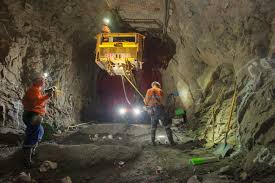The 151-year-old legislation that controls mining for copper gold, and other hard rock minerals on U.S.-owned lands is being modified by the Biden administration. One reform is to require firms to pay royalties for the first time on the minerals they extract.
The development of a mine leasing system and the coordination of permitting operations, across other federal agencies are also part of a strategy led by the Interior Department. The White House has been seeking to increase domestic mining for the minerals required for solar panels, electric vehicles, and other sustainable energy sources.Democratic lawmakers and environmental organizations have long bemoaned the fact that the United States does not collect royalties on minerals harvested from federal lands under the wording of 1872 legislation. According to the White House proposal, hard rock minerals generated on federal lands would be subject to a variable 4% to 8% net royalty. Congress must approve the plan, which is unlikely given that Republicans control the House and have traditionally resisted such fees.
An interagency working committee directed by the Interior Department, promoted the advantages of imposing royalties on around 750 hard rock miners on federal lands, largely in the West, unfazed by such political reality. About 70 coal mines whose owners are required to pay federal royalties are not included in the figure.The working group stated in a study released on Tuesday that “a royalty would ensure that American taxpayers receive fair compensation for minerals extracted from federal lands.” According to the research, the fee may also support initiatives to increase mining permits, clean up abandoned mine lands, and support state and tribal governments that support mining-dependent communities with infrastructure and services.
Among other nations that collect royalties on minerals, such as Australia, Canada, and Chile, the United States stands out. Additionally, hard rock mining generates royalties for at least a dozen Western states.The working group “did not receive any arguments as to why a properly designed leasing system could not be equally successful in the United States,” according to the report. “Although thoughtful concerns were raised by the mining industry regarding the existing hard rock leasing system that is used on certain federal lands,” the report said.
The strategy unveiled on Tuesday, according to working group chair and deputy interior secretary Tommy Beaudreau, is “a modernized approach” that would “address the needs of the clean energy economy while fulfilling our commitments to tribal nations, taxpayers, the environment, and future generations.A resilient manufacturing base for the technologies at the core of the president’s investing-in-America agenda such as batteries, electric vehicles, wind turbines, and solar panels, will be supported by securing a safe, sustainable supply of critical minerals, according to Joelle Gamble, deputy director of the White House National Economic Council.
While praising the findings, tribes and environmental organizations encouraged President Joe Biden to take additional measures to safeguard locals, holy sites, and water supplies. The working group was established by the White House the previous year after Biden promised to increase the production of lithium, nickel, and other minerals required to fuel electric vehicles and other renewable energy sources.The Centre for Biological Diversity, an Arizona-based group, has a southern Rockies director named Allison Henderson. “These modest reforms are a good first step, but they’re not enough to safeguard our water and communities,” she said. The Biden administration needs to make use of all of its powers to modernize these outmoded mining regulations, stop further mining sector destruction, and save a habitable earth for future generations.
The National Mining Association’s president and CEO, Rich Nolan, claimed that the report accomplished little to further Biden’s stated intention to secure domestic mineral supply while promoting ethical mining.Nolan said in a statement that the introduction of a leasing system, the imposition of a harsh “dirt tax,” and proposed royalties of up to 8% “will throw additional obstacles in the way of responsible domestic projects, forcing the U.S. to double-down on our already excessive import reliance from countries with questionable labor, safety, and environmental practices.”
The leading Republican on the Senate Energy and Natural Resources Committee, John Barrasso of Wyoming, claimed that Biden was “taking a sledgehammer to affordable, reliable energy.”If implemented, the proposed mining regulations “will force us to buy more critical minerals” from China and other nations that employ forced or child labor “instead of harnessing our abundant resources here at home,” Barrasso warned.

















